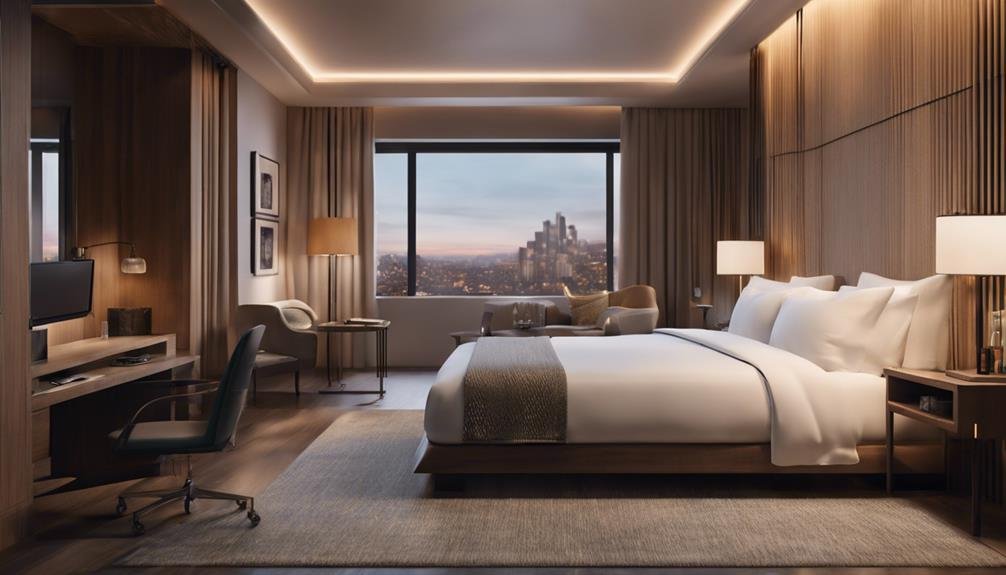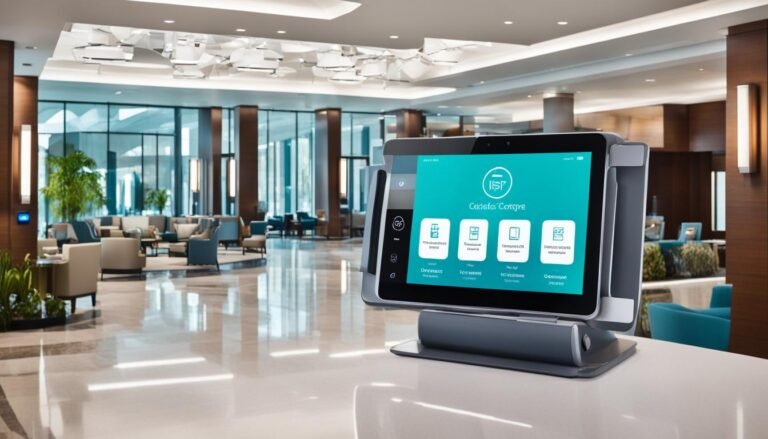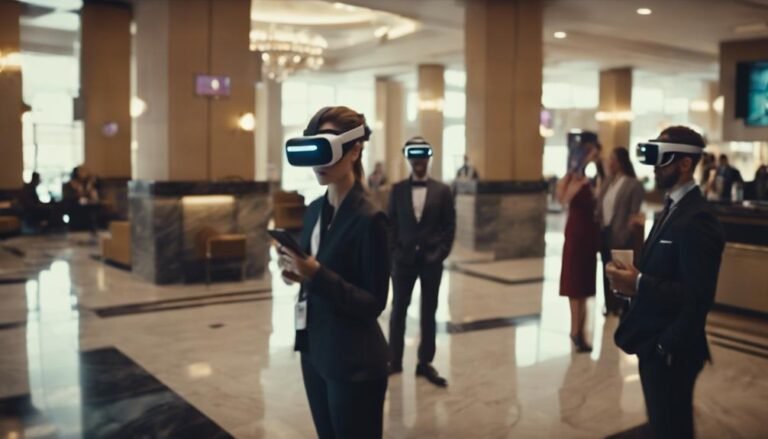Smart Hospitality: Exploring the Integration of AI and IoT in Modern Hotels
Embracing AI and IoT in modern hotels reshapes guest experiences through personalized services and efficient energy management. This integration enables anticipatory guest recommendations, streamlined check-ins, and operational excellence. Smart mirrors offer personalized features like fitness classes. AI predicts guest needs and automates services such as check-ins using smart devices. Room controls through IoT personalize lighting, entertainment, and services, enhancing guest comfort sustainably. The future of smart hospitality lies in seamlessly blending technology for superior guest satisfaction and operational effectiveness.
Key Takeaways
- AI and IoT enhance guest experiences with personalized recommendations and services.
- Energy management solutions optimize HVAC systems and promote sustainability.
- Seamless communication through IoT automates hotel functions for operational efficiency.
- Smart mirror technology offers interactive features like fitness classes and news updates.
- IoT-enabled room control systems personalize guest environments for comfort and sustainability.
Enhancing Guest Experiences
Leveraging advanced AI and IoT technologies in modern hotels has revolutionized the hospitality industry, enhancing guest experiences to unprecedented levels of personalized service and efficiency. Through AI-powered recommendations, hotels can offer tailored suggestions to guests, ranging from personalized dining options to curated local experiences. By analyzing guest preferences and behavior patterns, AI can anticipate needs and provide proactive recommendations, enhancing the overall stay experience.
Furthermore, IoT-connected amenities play a pivotal role in enhancing guest experiences. From smart room controls that adjust lighting and temperature based on preferences to connected devices that offer seamless access to entertainment options, IoT technology creates a more convenient and enjoyable environment for guests. The ability to control room settings through voice commands or mobile apps adds a layer of sophistication and modernity to the guest experience, setting a new standard for hotel stays.
Personalized Services Through AI
Harnessing the capabilities of artificial intelligence, modern hotels are elevating guest experiences through personalized services that anticipate and cater to individual needs with unparalleled precision and efficiency. AI driven customization allows hotels to gather insights from IoT data to understand guest preferences and behaviors better. By analyzing data such as room temperature preferences, entertainment choices, and preferred amenities, hotels can create personalized experiences for each guest.
Through AI algorithms, hotels can predict guest needs before they even arise, offering services or suggestions tailored to each individual. For example, if a guest typically enjoys a morning workout, the hotel can automatically set up a gym appointment or provide information about nearby fitness facilities. This level of personalized service not only enhances the guest experience but also fosters loyalty and positive reviews.
Moreover, AI can also be used to streamline check-in processes, recommend local attractions, or suggest personalized dining options based on dietary restrictions or past preferences. By leveraging AI and IoT data insights, modern hotels can offer a level of service that goes above and beyond traditional hospitality, creating memorable and unique experiences for every guest.
Efficient Energy Management Solutions
Implementing energy-saving sensors and automated lighting controls in modern hotels can revolutionize energy management practices. These technologies enable hotels to optimize energy consumption based on occupancy levels and natural light availability, leading to significant cost savings and reduced environmental impact.
Energy-Saving Sensors
How can energy-saving sensors revolutionize the efficiency of energy management solutions in modern hotels?
Smart sensors equipped with advanced technology can play a significant role in optimizing energy usage within hotel premises. These sensors can monitor and regulate heating, ventilation, and air conditioning systems based on occupancy levels and environmental conditions, ensuring energy is not wasted in unoccupied rooms.
By detecting motion, light, and temperature, these sensors can automatically adjust settings to maintain guest comfort while minimizing energy consumption. The integration of energy-saving sensors in modern hotels not only reduces operational costs but also aligns with sustainable practices, making the hospitality industry more environmentally friendly and economically efficient.
This innovative approach to energy management showcases the potential of smart technologies in enhancing hotel operations.
Automated Lighting Controls
With the rapid advancement of technology, automated lighting controls have emerged as a pivotal component in efficient energy management solutions for modern hotels. Automated systems allow hotels to optimize energy consumption by automatically adjusting lighting levels based on occupancy, natural light availability, and time of day. By integrating these energy-efficient solutions, hotels can greatly reduce their electricity usage and operational costs while maintaining a comfortable environment for guests. Below is a table highlighting the benefits of automated lighting controls in hotels:
| Benefits of Automated Lighting Controls |
|---|
| Energy-efficient solutions |
| Cost-effective implementation |
| Enhanced guest comfort |
| Customizable settings |
| Remote monitoring and control |
Seamless Communication With Iot
Efficient communication within IoT networks is pivotal for enhancing operational efficiency and guest experience in modern hotels. IoT connectivity enables seamless automation of various hotel functions, such as room temperature control, lighting adjustments, and even personalized guest services. By integrating IoT devices like smart thermostats, sensors, and voice-controlled assistants, hotels can streamline operations and deliver a more tailored experience to their guests.
Seamless communication within the IoT ecosystem allows for real-time monitoring and control of different systems, leading to proactive maintenance and quicker issue resolution. For instance, if a room's temperature exceeds a guest's preferred range, IoT sensors can automatically adjust it without manual intervention, ensuring guest comfort and satisfaction.
Moreover, IoT-enabled communication systems can facilitate efficient staff coordination by sending automated alerts or notifications for tasks like room cleaning, maintenance requests, or guest check-ins. This streamlined communication enhances overall operational efficiency, reduces response times, and ultimately contributes to a more seamless and enjoyable guest experience in modern hotels.
Enhancing Operational Efficiency
Enhancing operational efficiency in modern hotels through the integration of AI and IoT technologies is paramount for staying competitive in the ever-evolving hospitality industry landscape. By leveraging workforce optimization and predictive maintenance capabilities offered by AI and IoT, hotels can streamline their operations, allocate resources effectively, and minimize downtime. Real-time analytics provided by these technologies enable hotel management to make data-driven decisions promptly, leading to improved productivity and enhanced guest experiences.
Predictive maintenance tools can anticipate equipment failures before they occur, allowing for proactive maintenance measures to be taken. This not only reduces unexpected downtime but also extends the lifespan of critical assets. Additionally, workforce optimization through AI algorithms can assist in scheduling staff efficiently based on occupancy levels and guest needs, leading to enhanced service delivery while controlling labor costs.
Smart Room Technology Integration
How can modern hotels revolutionize guest experiences through the seamless integration of smart room technology? By incorporating cutting-edge solutions, hotels can enhance comfort, convenience, and efficiency for their guests. Here are four key ways in which smart room technology can be integrated:
- Smart Thermostat Integration: Hotels can adjust room temperatures based on guest preferences and occupancy, ensuring maximum comfort while saving energy.
- Room Occupancy Tracking: By monitoring room occupancy in real-time, hotels can personalize services, streamline housekeeping operations, and enhance security.
- Voice Controlled Devices: Implementing voice-controlled assistants allows guests to control room features such as lighting, temperature, and entertainment systems hands-free.
- Smart Mirror Technology: Interactive smart mirrors can display information like weather forecasts, news updates, and hotel services while offering functionalities like virtual fitness classes or makeup tutorials.
Future Trends in Smart Hospitality
The future of smart hospitality is marked by AI-powered personalization and IoT-enabled room control systems.
By leveraging artificial intelligence, hotels can offer tailored services and experiences to guests, enhancing their stay.
Additionally, the integration of IoT technology allows for seamless automation and customization of room settings, setting a new standard for modern hotel experiences.
AI-Powered Personalization
In the domain of smart hospitality, the integration of AI-powered personalization is revolutionizing guest experiences with tailored services and seamless interactions. Through AI-driven customization and IoT-driven personalization, hotels can now offer a level of service that was once unimaginable.
Here are four ways in which AI is transforming the guest experience:
- Personalized Recommendations: AI analyzes guest preferences and behaviors to offer tailored recommendations for dining, activities, and amenities.
- Predictive Service: Machine learning insights enable hotels to anticipate guest needs and provide proactive services.
- Automated Check-ins: Smart device personalization allows guests to check-in seamlessly using their smartphones, bypassing traditional front desk procedures.
- Virtual Assistants: AI-powered virtual assistants in rooms offer guests personalized recommendations, control room settings, and provide real-time assistance.
IoT-Enabled Room Control
With the rapid advancement of IoT technology in the hospitality industry, the implementation of IoT-enabled room control systems is poised to redefine the guest experience in modern hotels. Smart automation through IoT devices allows guests to control various aspects of their room, such as lighting, temperature, entertainment systems, and even room service requests, all through a centralized interface or voice commands.
This level of guest control not only enhances convenience but also promotes energy efficiency and sustainability within hotel operations. By personalizing the room environment to suit individual preferences, hotels can greatly improve guest comfort and satisfaction.
As hotels continue to embrace IoT technology for room control, the seamless integration of smart automation is expected to become a standard feature in the future of smart hospitality.
Conclusion
To sum up, the integration of AI and IoT in modern hotels revolutionizes the guest experience, personalizing services, optimizing energy usage, and enhancing operational efficiency.
The future of smart hospitality holds limitless possibilities, promising a seamless and immersive stay for guests.
As we continue to embrace these innovative technologies, the hospitality industry is set to soar to new heights, creating a truly unforgettable and unparalleled guest experience.







